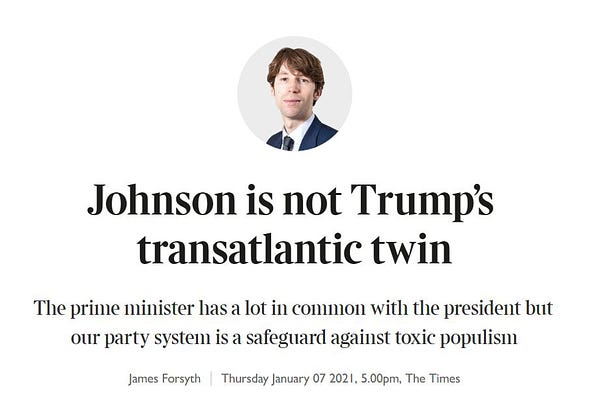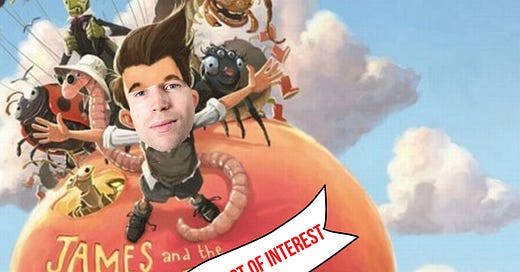James & The Giant Conflict of Interest: The Times commenters have noticed but they'll be ignored
The ridiculousness of having James Forsyth — husband of the Prime Minister's Official Spokesperson — comment on Boris Johnson's character is clear. But The Times doesn't care even if its readers do.
On Friday, hours before Donald Trump was bumped from Twitter forever, James Forsyth published a Times column trying to put pure blue Atlantic water between Boris Johnson and the departing President. Under the headline ‘Johnson is not Trump’s transatlantic twin’, he scrabbled to make excuses for the man who he knows well, whose Chancellor is his best friend (and godfather to his children), and who most critically is now his wife’s boss.


It’s not the first time Forsyth has used his slot in The Times to do the spadework for Johnson, putting in a second shift from his main work of digging the government out of shit in The Spectator. The problem is that Times readers aren’t falling for it. Here are just three comments from beneath the latest piece
“Did Allegra proofread this puff piece?”
“I just googled ‘James Forsyth’ and discovered that he is the husband of Allegra Stratton - The PM’s Spokesperson. I get that this is an opinion piece, and that James, and Allegra for that matter, are perfectly entitled to theirs, but perhaps our political editors should, where possible, not have a dog in the fight about which they are writing.”
The fact that the Times still gives Forsyth a tribune while his missus is in No. 10 smacks of... insider dealing? Or perhaps just a conflict of interest. The bedrock of British journalism is the adversarial nature of the press with those in power. Imagine explaining the Johnson-Stratton-Forsyth set-up to Edmund Burke!
Just as British columnists tend only to reach for Nineteen Eighty-Four when they want to lean on Orwell, there’s usually only one quote from Edmund Burke (“Those who don't know history are destined to repeat it.”) that they sprinkle on their own reheated observations about the world. I’ll come back to that notion of people who don’t know history later in this piece, but there’s another Burke aphorism that’s useful here:
Flattery corrupts both the receiver and the giver, and adulation is not of more service to the people than to kings.
Forsyth is a repeated flatterer of the Prime Minister, part of a corruption of the public sphere that stretches back decades, a mixing of the media and political classes that must be making some long-dead hacks spin at 45rpm in their graves.
As I wrote in an edition of this newsletter back in December — you can consider this one a sequel — Forsyth should at least be required to declare his conflicts of interest:
That’s why James Forsyth, political editor of The Spectator — the magazine which used to be edited by the Prime Minister — writes columns about that Prime Minister while his wife, Allegra Stratton, works as the PM’s official spokesman, and his best man — a school friend, and godfather to his children — is Chancellor of the Exchequer. These connections are known to those within the bubble but never — as would be the case in US journalism — explicitly declared under the author’s byline.
Some might argue, in bad faith and at length, that the mere fact that commenters on The Times website are ‘calling out’ the hypocrisy of Forsyth’s defence of the Prime Minister is a sign that things are working perfectly well. But not everyone reads the comments — which is arguably an act of masochism — and in print Forstyh’s words run unaccompanied by any sense that they come from someone with rather more skin in the game than even the most obsequious of client commentators.
Forsyth begins his latest column with an anecdote:
When Boris Johnson was foreign secretary he used to eat his lunch in the Foreign Office canteen. This was slightly to the annoyance of one of his political aides, who would have preferred to dine with him alone. But Johnson didn’t just want to eat there because of the hot food. He wanted to reassure the staff, many of them diplomats who privately regarded Brexit as a disaster, that it was going to be all right. Britain was not about to withdraw from the world, he told them. Quite the opposite.
Who was the source of that tale? A civil servant? Allegra Stratton? Or Boris Johnson himself? We don’t know because Forsyth doesn’t tell us. What’s clear though is that even in this trivial example he’s willing to give the Prime Minister the most generous reading of his actions.
While we know that Johnson was a clumsy, contemptuous, and ultimately lazy Foreign Secretary (there’s a whole documentary’s worth of clips of him in action to prove that), Forsyth wants us to know that Johnson wanted to “reassure” diplomats. If you recall, Johnson was the Foreign Secretary whose ‘misspeaking’ in Parliament made the situation for Nazanin Zaghari-Ratcliffe, still held captive by the Iranian state, much worse, and who said that the then ISIS stronghold of Sirte could “be the next Dubai once they clear the dead bodies away”. I’m sure diplomats were enormously reassured.
Among all of Forsyth’s dismissals of similarities between Trump and Johnson, there is also ahistorical horseshit deployed to support his arguments. He writes:
Populism in Britain tends not to get off the ground because our politicians tend to steal their causes — absorbing new trends into our stronger party system. In 1978 Margaret Thatcher’s talk of people feeling “swamped” by immigration caused much discomfort. But that recognition of public concern also stopped the National Front, which was making alarming progress at the polls, in its tracks.
The notion that Thatcherism wasn’t a form of populism, with its promises that everyone could own property, everyone could own shares alongside the villainisation of the ‘other’, is debatable.
But even more damaging is the notion that Thatcher folding ‘concerns about immigration’ — the ‘civilised’ commentariat’s synonym for racist scaremongering — into her policy platform was what stopped the National Front. Of course, it would be too much for Forsyth to recognise the role of activists, protests and direct action, much of it coming from the very working classes he assumes must be ‘concerned’ racists, in defeating the NF.
That twisting of history is a classic example of the way that commentators like Forsyth assert that the only route to electoral success is by pandering to racist notions rather than combating and debunking them. Forsyth is basically Dril if the pseudonymous Twitter comedian was a Wykehamist:

Forsyth ends his column with a high-handed kicker:
We must learn how to prevent, or at least pierce, these bubbles. Without a set of shared facts, we risk our politics becoming ever-more polarised and the threat of our own January 6 growing ever greater.
He writes those words from within one of the most rarified bubbles in Britain — the Westminster elite — as the political editor for one of the most influential voices within that bubble, The Spectator, with his bubble boy best friend sat atop the Treasury and his bubble bride being the public face of Borisism.
The Times has a paywall and those who comment on its articles are not drive-by trolls — they pay for the privilege. Yet as many of them notice Forsyth being given a platform to boost his own circle, the editors will simply dismiss them as bitter malcontents. They’ll take their money but they don’t value their opinions. They’re not inside the bubble, see?





